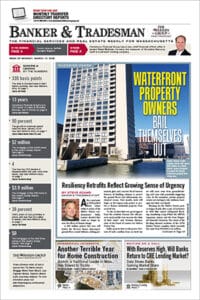The free-flowing funding climate in biotech slowed to a trickle in 2022, pressuring startups seeking to survive and expand in Massachusetts and choking off the supply of new tenants to Boston’s explosion of new life science real estate.
Greater Boston’s life science market is now facing a 21.5 percent overall vacancy rate, 11.38 billion square feet of vacant or available sublease space and nearly 400,000 square feet of negative absorption in the first half of this year according to Colliers’ second-quarter research, the most recent data available.
As life science buildings that broke ground without tenants in the heady days of 2021 and early 2022 deliver, those numbers keep ticking up. In the second quarter, alone, Colliers reported the biotech industry’s hotbed of East Cambridge and Kendall Square clocked in 215,150 square feet of negative absorption and a 19.1 percent vacancy rate as some suburban landlords poach companies by offering shorter commutes and lower rents even as new buildings keep pushing up its vacancy rates.
And in other markets like Worcester, that once anticipated a boom in biomanufacturing development driven by an exploding biotech sector’s need to manufacture new drugs, even flagship developments are on hold.
While venture capital funding and IPO activity is starting to recover, the Bay State’s biotech industry is looking to establish its own funding vehicle to prop up members’ financial position.
“Startups want to be here in Massachusetts,” said Kendalle Burlin O’Connell, CEO of trade group MassBio. “This is about: How can they accelerate their science and get that follow-on investment?”
Venture capital funding, the traditional route to growth in biotech, remains scarce for early-stage companies, prompting MassBio to begin preparing to launch its own “seed fund.”
While funding sources are yet to be determined, the MassBio Seed Fund would work with startups in the MassBioDrive accelerator to fill gaps in early-stage funding, Burlin O’Connell said.
Released today, the MassBio Vision 2030 report lays out the trade group’s strategy for near-term growth of an industry that has a 117,000-employee footprint statewide.
Beyond funding, MassBio will support startups with its purchasing consortium, MassBioEdge, and pairing companies with executive mentors and incubator space.
Massachusetts-headquartered biotechs received 31 percent of all U.S. industry venture capital investment in 2023, up from 25 percent in 2022, but investors have shied away from riskier early-stage companies.
The Bay State’s competitiveness also is threatened by recruitment and retention challenges. Senior executives are reluctant to relocate to Massachusetts from out-of-state due to the high cost of living, according to industry surveys. Companies also have difficulty attracting applicants for entry-level positions such as lab technicians.
The Cambridge-based organization continues to lobby on behalf of Gov. Maura Healey’s proposed renewal of the state’s life science initiative, which would provide $1 billion in incentives to the industry over the next decade.
Biomanufacturing sector growth is heavily dependent upon development of speculative facilities giving biopharma and third-party manufacturing companies the ability to bring products to market quickly and minimize risk, Burlin O’Connell said. The biomanufacturing sector shrank slightly during the past year, according to a previous MassBio report, despite efforts to encourage its growth as an economic development driver outside Greater Boston.
The potential passage of the federal Biosecure Act banning some large Chinese biopharma drug producers from operating in the U.S. could provide opportunities for additional domestic biomanufacturing, industry officials predict.









